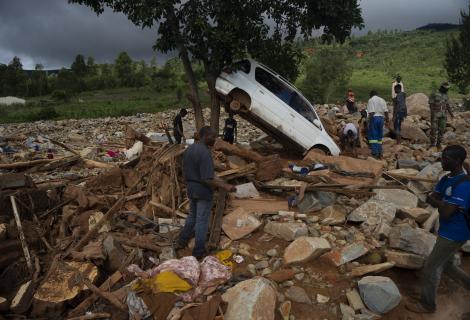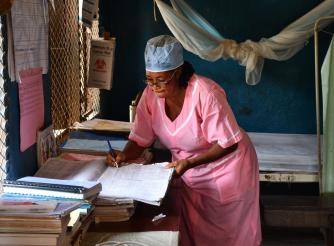Market mechanisms for loss and damage climate finance fail human rights test

Market mechanisms to fund the cost of repairing the harmful impacts of climate change fail to protect the rights of communities already suffering the most from increasingly severe weather events such as flooding, droughts and cyclones, new analysis by ActionAid finds.
It is estimated that by 2030 the global, annual cost of repairing loss and damage specifically associated with climate change will total $300 billion, increasing to $1.2 trillion a year by 2060.
ActionAid’s report, Market Solutions to help Climate Victims Fail Human Rights Test, examines the current options for market, state and ‘innovative’ funding mechanisms available to cover the soaring costs of loss and damage related to rising global temperatures, reviewing their effectiveness against key human rights principles.
Researchers found that none of the market mechanisms reviewed, which included catastrophe risk insurance and climate-themed bonds, are compliant with a rights-centred approach.
Most market solutions put the financial burden back on developing countries, who are least responsible for causing the climate crisis. These mechanisms also fail against transparency and accountability measures and do not involve the people most at risk in decision-making to protect their rights.
The analysis identified clear winners:
- Progressive taxes such as a Climate Damages Tax on oil, gas and coal extraction and the Financial Transaction Tax, a small levy to raise revenue from the trading of financial instruments.
- Shifting state subsidies away from fossil fuels and towards addressing the impacts of climate change and funding a ‘Just Transition’ to a low-carbon global economy.
Speaking ahead of this week’s meeting of the Executive Committee of the Warsaw International Mechanism for Loss and Damage in Bonn, Germany, Harjeet Singh, ActionAid’s global lead on climate change, says:
“Concrete financing solutions are urgently needed to repair the devastation already being caused by climate change and to prepare for an uncertain future.
“Our analysis shows that ending state subsidies for fossil fuels and a progressive tax on the oil and gas industry would raise the billions needed to adapt to and repair the harmful impacts of global warming. These solutions put the onus on those responsible for the climate crisis and protect the rights of those most at risk.”
ActionAid will be in Bonn, urging the commission to consider the innovative financing solutions that have the capacity to repair the soaring costs of climate change and address growing global inequality.
Harpreet Kaur Paul, lead author of the report and a policy and campaign strategist, says:
“Climate change is increasingly threatening the everyday freedoms many of us take for granted. The right to life, food, water, health and education, being able to choose to live in the community where we grew up, are all at risk.
“The lives and livelihoods of communities at the frontline of climate change are already being devastated by rising global temperature. They have done the least to cause the climate crisis.
“The early industrialised states and industries that are responsible must cover the soaring costs of repairing the harmful impacts of climate change.”
A Climate Damages Tax on the fossil fuel industry could pay for the financial costs of loss and damage, and fund programmes to help communities move towards a low carbon economy. It would raise revenues of between $75-150 billion (at a rate of $6 per tonne of CO2) and $500-1,000 billion (at a rate of $40 per tonne of CO2) a year.
A Financial Transaction Tax covering the European Union putting a levy on shares and bonds at 0.1% and derivative agreements at 0.01% has the potential to raise $63billion, and a global FTT could raise significantly more, given the scale of financial instrument trading.
Reducing the ongoing state subsidies for fossil fuels could raise $300billion, increasing to $5.3trillion when indirect subsidies are included. This would end the paradox of governments continuing to lower the cost of fossil fuel energy production while claiming to be committed to mitigation, adaptation and redressing the loss and damage caused by the impact of climate change.
Ends.
For more information and interviews contact the ActionAid press office on +44(0)7795642990 or email jenna.pudelek@actionaid.org.
Notes to editors:
From 9 to 11 April, the Executive Committee to the WIM will meet for the ninth time. Since its establishment in 2013, the mechanism has failed to propose concrete ways in which victims of climate change will receive reparation.
More details about the meeting can be found here.
Harpreet Kaur Paul is a policy and campaign strategist. She is exploring avenues to ensure justice for victims of loss and damage associated with climate change through her PhD research at Warwick Law School.
The market mechanisms reviewed include catastrophe risk insurance, climate-themed bonds and their certification, and catastrophe bonds. The state-based mechanism reviewed is contingency finance.
The innovative financing mechanisms considered include the Financial Transaction Tax, the International Airline Passenger Levy, Solidarity Levy, Bunker Fuels Levy, and Climate Damages Tax.
The report evaluates these mechanisms for repairing the harmful impacts of climate change against the following five key human rights principles:
- Ensuring a safe, clean, healthy and sustainable environment in order to respect, protect and fulfil human rights of current and future generations;
- Enabling transparency in decision making and the extent of public participation in decision making relating to how loss and damage associated with climate change will be repaired and redressed, with specific attention being paid to the participation and protection of particularly vulnerable groups, and–crucially–victims of climate change harms themselves;
- Providing access to effective remedies for loss and damage associated with climate change harm recognising that climate change will be felt most acutely by those segments of the population who are already in vulnerable situations owing to factors such as geography, poverty, gender, age, indigenous or minority status and disability, national or social origin, birth or other status;
- Ensuring differentiated responsibility, evaluating the extent to which those with larger responsibility for climate change harms contribute to remedying, redressing and repairing loss and damage associated with climate change; and
- Respecting, protecting and fulfilling human rights in the actions they take to address environmental challenges and pursue sustainable development.

